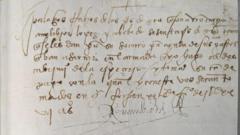This significant repatriation marks a win in the fight against the illicit trafficking of cultural heritage, as Mexico seeks to restore its historical artifacts lost during the late 20th century.
FBI Repatriates Historic Cortés Document to Mexico After 35 Years

FBI Repatriates Historic Cortés Document to Mexico After 35 Years
The FBI has successfully returned a 500-year-old manuscript signed by the Spanish conquistador Hernán Cortés to Mexico, resolving a decades-long search for the missing pages.
The FBI has made strides in returning a stolen 500-year-old manuscript signed by the famed conquistador Hernán Cortés back to Mexico. The page, which dates back to 1527, is part of a collection of 15 pages thought to have been taken from Mexico's national archives between 1985 and 1993. This particular page was found on US soil and was repatriated to Mexico on Wednesday, following cooperation between US agencies and the Mexican government.
Cortés, known for leading expeditions that culminated in the fall of the Aztec Empire and the establishment of Spanish dominion in the Americas, used the manuscript to detail expenses for his explorations. The page, appraised as critical for understanding historical contexts, describes payments related to preparations for expeditions that helped delineate what would come to be known as New Spain, a vast colony that expanded across much of western and central North America.
The manuscript surfaced in the US and was identified by Mexican officials who had previously reported 15 pages missing after the documents were recorded on microfilm in 1993. Notably, the recovered page bore a wax number inscribed during a cataloging effort between 1985 and 1986, hinting at its theft during that time. With the Mexican government's request for the FBI’s art crime team resulting in investigations, the document’s location was eventually unearthed through meticulous open-source research.
Despite the successful recovery, the FBI has indicated that prosecution is unlikely. “No one will face prosecution due to the page changing hands several times,” stated Special Agent Jessica Dittmer of the agency's art crime division. She added that the document plays a critical role in illuminating aspects of early colonial explorations and the financial logistics surrounding them.
As tensions between Mexico and the US over tariffs and immigration policy loom large, this act of cultural repatriation represents a significant gesture towards combating the trafficking of antiquities. Dittmer emphasized that artifacts like this one are vital to Mexico's cultural narrative and historical understanding, underscoring the need for preservation and protection of such documents.
The FBI has committed itself to continuing the search for the other missing pages from this historical collection. Notably, earlier this year, the agency returned another document signed by Cortés to Mexico, signaling an ongoing effort to mend the past and restore crucial pieces of cultural history.
Cortés, known for leading expeditions that culminated in the fall of the Aztec Empire and the establishment of Spanish dominion in the Americas, used the manuscript to detail expenses for his explorations. The page, appraised as critical for understanding historical contexts, describes payments related to preparations for expeditions that helped delineate what would come to be known as New Spain, a vast colony that expanded across much of western and central North America.
The manuscript surfaced in the US and was identified by Mexican officials who had previously reported 15 pages missing after the documents were recorded on microfilm in 1993. Notably, the recovered page bore a wax number inscribed during a cataloging effort between 1985 and 1986, hinting at its theft during that time. With the Mexican government's request for the FBI’s art crime team resulting in investigations, the document’s location was eventually unearthed through meticulous open-source research.
Despite the successful recovery, the FBI has indicated that prosecution is unlikely. “No one will face prosecution due to the page changing hands several times,” stated Special Agent Jessica Dittmer of the agency's art crime division. She added that the document plays a critical role in illuminating aspects of early colonial explorations and the financial logistics surrounding them.
As tensions between Mexico and the US over tariffs and immigration policy loom large, this act of cultural repatriation represents a significant gesture towards combating the trafficking of antiquities. Dittmer emphasized that artifacts like this one are vital to Mexico's cultural narrative and historical understanding, underscoring the need for preservation and protection of such documents.
The FBI has committed itself to continuing the search for the other missing pages from this historical collection. Notably, earlier this year, the agency returned another document signed by Cortés to Mexico, signaling an ongoing effort to mend the past and restore crucial pieces of cultural history.

















